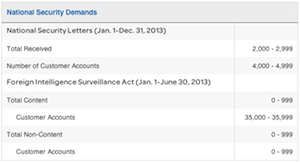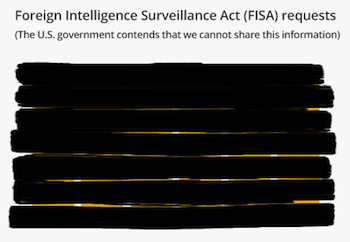The federal court set up to review government requests for surveillance involving issues of national security is either rubber-stamping everything that it sees, or the FBI and the National Security Agency are incredibly good at filing these requests. A new report claims that the court approved every single one of the 1,457 requests it received last year. [More]
fisa

Did U.S. Use Secret Court To Force Tech Companies To Weaken Encryption?
Legislators in D.C. are currently considering a law that would compel tech companies to have weak device and software encryption so that law enforcement can snoop when necessary, while federal prosecutors have repeatedly used a 227-year-old law to try to force Apple and Google to work around existing security on their products. A new lawsuit seeks to find out if the government has also been using a highly secretive court to force tech companies to assist in breaking their own encryption. [More]

AT&T Received Foreign Intelligence Surveillance Act Orders For 35,000 Accounts In 6 Months
Weeks after the U.S. Attorney General issued guidance allowing tech and telecom companies to provide slightly more information about federal law enforcement requests, AT&T has issued its first accounting of these queries. And according to the data, the Death Star received national security letters dealing with up to 5,000 accounts in all of 2013, while court orders issued under the Foreign Intelligence Surveillance Act during the first half of 2013 were tied to more than 35,000 accounts. [More]

Google Mocks Opacity Of National Security Requests While Feds Try To Hide Court Action From Public
For quite some time, Google and other Internet biggies have argued that they should be able to reveal relatively detailed data to the public about user-information requests from federal law enforcement agencies, and specifically those that fall under that black umbrella of national security. In its latest transparency report, Google uses a visual to show its distaste for this opacity. Meanwhile, the federal government is attempting to argue its case for the lack of transparency behind doors closed so tight that even the others involved in the request won’t be privy to what’s said. [More]

../..//2008/07/10/the-senate-passed-the-fisa/
The Senate passed the FISA bill today, which effectively puts an end to any chance of legal repercussions for telcos who helped the government spy on citizens. Senator Obama voted for it, Senator McCain didn’t vote, and Senator Clinton, for what it’s worth, voted against it. Find out how your senator voted here. [TechCrunch]

../..//2008/06/26/as-the-new-fisa-billthe/
As the new FISA bill—the one that grants retroactive immunity to wiretapping telcos—moves closer to a final vote in the Senate (and a threatened filibuster), Ars Technica looks at the money. AT&T, Verizon, and Sprint donated double the amount to House Democrats who supported the bill than to those who opposed it. [Ars Technica]



